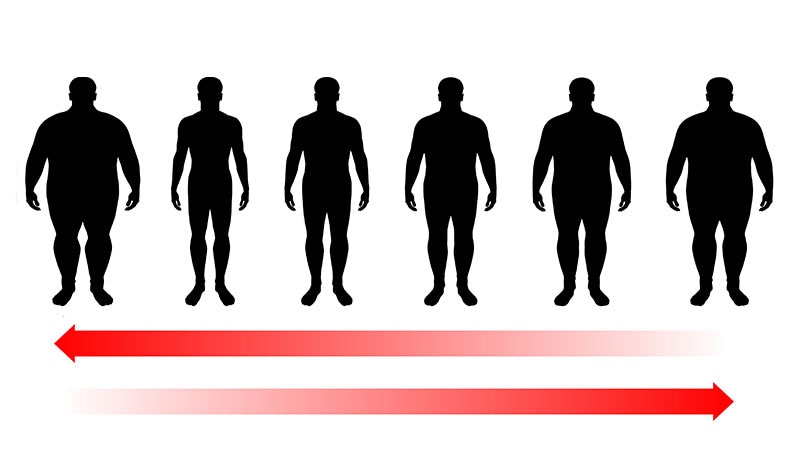What Happens When Newer Weight Loss Meds Are Stopped?

Social media shops are entire of tales about famous people who have misplaced body weight with the new era of incretin drugs like semaglutide (Ozempic and Wegovy) and tirzepatide (Mounjaro).

Jaime P. Almandoz, MD, MBA
Some of these medicines are authorised for treating obesity (Wegovy), whereas many others are authorized for variety 2 diabetes (Ozempic and Mounjaro). Tirzepatide (Mounjaro) has been fast-tracked for acceptance for fat loss by the US Food and Drug Administration this year, and in the very first of the sequence of experiments wanting at its effect on obesity, the SURMOUNT-1 trial, tirzepatide demonstrated a signify body weight reduction of all around 22% in people without the need of diabetic issues, spurring sizeable off-label use.
Our places of work are whole of individuals who have taken these drugs, with unprecedented advancements in their weight, cardiometabolic health and fitness, and good quality of everyday living. What takes place when patients stop getting these prescription drugs? Or far more importantly, why halt them?
Although these medicines are pretty effective for weight decline and managing diabetes, there can be adverse results, principally gastrointestinal, that restrict remedy continuation. Nausea is the most popular facet result and normally diminishes in excess of time. Gradual dose titration and nutritional modification can limit unwelcome gastrointestinal facet outcomes.
Drug-induced acute pancreatitis, a exceptional adverse party demanding individuals to cease remedy, was found in around .2% of men and women in medical trials.
Drugs Successful but Price Prohibitive?
Over and above adverse results, clients could be forced to cease treatment because of medication expense, alterations in insurance policy protection, or problems with drug availability.
Two incretin therapies at the moment authorized for treating being overweight — liraglutide (Saxenda) and semaglutide (Wegovy) — price tag close to $1400 for each month. Insurance policy protection and manufacturer bargains can make treatment method very affordable, but anti-being overweight medicines are not included by Medicare nor by a lot of employer-sponsored industrial options.
Changes in work or insurance policy coverage, or expiration of producer copay cards, may have to have people to cease or improve therapies. The greater prescribing and total expenditure of these prescription drugs have prompted insurance plan ideas and self-insured groups to look at whether providing coverage for these medicines is sustainable.
Confined protection has led to sizeable off-label prescribing of incretin therapies that aren’t permitted for managing weight problems (eg, Ozempic and Mounjaro) and compounding pharmacies selling peptides that allegedly have the energetic pharmaceutical ingredients. High demand for these remedies has created sizeable offer shortages over the earlier 12 months, leading to lots of individuals to be devoid of therapy for major periods of time, as reported in Medscape.
A short while ago, I noticed a client who missing over 30 lb with semaglutide (Wegovy). She then transformed companies and the medication was no extended protected. She gained back practically 10 lb more than 3 months and was approved tirzepatide (Mounjaro) off-label for pounds loss by a further company, using a company discount card to make the medication inexpensive. The client did very well with the new regimen and shed about 20 lb, but the pharmacy stopped filling the prescription when alterations had been made to the discount card. Frightened of regaining the fat, she arrived to see us as a new client to focus on her alternatives with her lack of coverage for anti-obesity medications.
Stopping Equals Body weight Get back
Being overweight is a long-term ailment like hypertension. It responds to treatment method and when people today prevent getting these anti-being overweight drugs, this is generally related with amplified urge for food and fewer satiety, and there is subsequent fat get back and a recurrence in excessive pounds-connected troubles.
The Action-1 trial extension confirmed an initial suggest physique body weight reduction of 17.3% with weekly semaglutide 2.4 mg in excess of 1 12 months. On average, two thirds of the weight missing was regained by participants within 1 year of halting semaglutide and the study’s way of living intervention. Numerous of the improvements viewed in cardiometabolic variables, like blood glucose and blood force, similarly reverted to baseline.
There are also 2-calendar year facts from the Phase-5 demo with semaglutide 3-yr data from the SCALE demo with liraglutide and 5-12 months nonrandomized info with several agents that display durable, clinically major pounds loss from clinical therapies for obesity.
These facts alongside one another show that drugs are efficient for long lasting bodyweight reduction if they are ongoing. Nonetheless, this is not how weight problems is currently handled. Anti-obesity medicines are prescribed to a lot less than 3% of qualified persons in the US, and the typical period of treatment is considerably less than 90 times. This treatment length is just not adequate to see the full added benefits most drugs offer and unquestionably does not assistance very long-expression pounds routine maintenance.
In addition to preserving bodyweight loss from professional medical therapies, a new examine confirmed that incretin-made up of anti-being overweight medicine regimens were successful for treating weight get back and facilitating much healthier excess weight soon after bariatric surgical treatment.
Persistent treatment is wanted for fat servicing due to the fact various neurohormonal variations happen owing to weight decline. Metabolic adaptation is the relative reduction in energy expenditure, down below what would be expected, in people right after fat reduction. When this is blended with physiologic adjustments that improve appetite and reduce satiety, a lot of men and women create a positive vitality stability that final results in weight get back. This has been observed in actuality Tv set displays these types of as The Greatest Loser: It is really biology, not willpower.
Sad to say, quite a few people — which includes healthcare suppliers — do not comprehend how these modifications encourage excess weight regain and clients are way too normally blamed when their pounds goes back up after prescription drugs are stopped. This blame is significantly misinformed by weight-biased beliefs that folks with weight problems are lazy and deficiency self-management for bodyweight loss or maintenance. Nobody would be surprised if someone’s blood strain went up if their antihypertensive prescription drugs had been stopped. Why do we imagine so otherwise when managing being overweight?
The prevalence of obesity in the US is more than 40% and expanding. We are lucky to have new drugs that on typical guide to 15% or better weight reduction when merged with way of life modification.
Having said that, these drugs are costly and the constrained insurance coverage currently out there may perhaps not make improvements to. From a affected individual expertise point of view, it can be distressing to have to discontinue treatment options that have assisted to achieve a healthier body weight and then encounter get back.
Men and women need to have better obtain to evidence-primarily based remedies for weight problems, which include things like way of life interventions, anti-being overweight prescription drugs, and bariatric procedures. Profitable procedure of obesity should really involve a personalised, affected person-centered tactic that may demand a mix of therapies, this sort of as medications and surgery, for lasting pounds management.
Observe Dr Almandoz on Twitter: @JaimeAlmandoz
For additional diabetes and endocrinology news, follow us on Twitter and Fb








